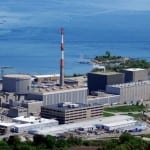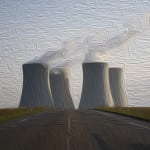Nuclear power will play a significant role in the nation’s energy future, though a nuclear expansion will be hindered by several factors—foremost among them low natural gas prices and a lack of a comprehensive national energy policy, Dominion Chair, President, and CEO Thomas Farrell II told attendees at the Platts Nuclear Energy Conference in Washington, D.C., on Wednesday.
"[S]cale, power density, reliability, environmental footprint, technical innovation and economic value . . . lead to one conclusion: nuclear power must figure prominently in our energy future—especially if we are committed to de-carbonizing our economy. Not surprisingly, as we look to the future, we see a relentless and growing hunger for power," he said.
The Fukushima accident had slowed the growth of nuclear worldwide, but it would not reverse the overall global trend toward expansion, Farrell said. "There will be, however, an increase in expenditures mandated by the NRC. For example, I have seen estimates ranging from $15 million to $60 million per unit for containment vent filters. And NRC staff recently proposed a new rule requiring utilities to upgrade key emergency response capabilities."
Dominion’s nuclear portfolio consists of four stations: North Anna and Surry, two regulated stations in Virginia, and two merchant stations, Kewaunee in Wisconsin and Millstone in Connecticut. Their combined generating capacity is about 6,200 MW, or about 22% of the company’s total fleet capacity and about 44% of its total electric output. The rest of its fleet is fossil-fired and renewable generation.
The company is expected within two years to issue a decision about whether to continue construction for a third proposed unit at North Anna. Dominion received an early site permit for the unit in 2007 and is expecting to obtain a combined operating license from the Nuclear Regulatory Commission sometime in 2015.
But among key obstacles to a nuclear expansion faced by Dominion—and other U.S. nuclear generators—is the lack of a sound waste management strategy. "Perhaps the greatest obstacle to growth, at least in the near term, is low natural gas prices, resulting principally from the explosion of shale gas development. Frankly, at $3 gas, it is pretty hard to build anything—including natural gas plants," he said.
For nuclear operators—particularly those in the merchant sector—"tight margins, coupled with weak demand and a slow economy, have created a challenging operating environment, to say the least," he said.
Farrell pointed to Dominion’s recent announcement to close and decommission its single-unit 556-MW Kewaunee station in northeast Wisconsin, saying it was necessary because "a combination of factors has simply made it uneconomic to continue operating the station beyond the second quarter of this year." The company had been unable to find a buyer for the plant after it was put up for sale in April 2011.
The Midwest Independent System Operator (MISO) on Tuesday concluded the shutdown and retirement of Kewaunee would not affect the reliability of the regional electric transmission system. Dominion is now expected to shutter the plant in the second quarter of 2013.
Farrell cautioned, however, that though current market conditions favored natural gas, maintaining a diverse supply of fuels in a generating portfolio "safeguards customers from price volatility—a longstanding concern in natural gas markets. So, going all in on gas defies everything we know and preach about diversification and prudent risk management."
Companies investing or buying a nuclear station were focused on the "long haul," he said. "After all, we are talking about an asset with a 60-year lifespan. … They are certainly not operating with a near-term trading mentality—or should not be if they want to stay in business."
What the U.S. lacks—and needs with urgency—is a national energy plan, Farrell concluded. "I have pushed for it for years and am getting impatient for it to happen. I also have no illusions about the difficulty of creating such a plan, especially in the polarized—and often paralyzed—policy climate that pervades Congress."
It would take much time and leadership, but it should be a national priority, one that should be elevated to the level of foreign affairs and national defense, he said. "We must begin treating energy, and electricity in particular, for what it is—the world’s most important commodity and the source of global prosperity."
Calls had emerged from former Sen. Byron Dorgan and Trent Lott, former EPA Administrator William Reilly, and General James Jones (the president’s former National Security Adviser) for the creation of a cross-agency, national energy council modeled on the National Security Council, he noted. That body would coordinate with Congress, industry, and other stakeholders to come up with a long-term plan to meet the nation’s energy challenges. Farrell called instead for the creation of a new position, a national energy advisor to the president. It would be "someone in the White House who would coordinate with the National Security Advisor and the Chief Economic Advisor on important energy issues," he said.
Sources: POWERnews, Dominion
—Sonal Patel, Senior Writer (@POWERmagazine)








